Senator: Emails Reveal EPA, Green Group in ‘Beyond Cozy’ Relationship

No laughing matter? EPA Administrator Gina
McCarthy gets a kick out of something President Obama says at the June 2
announcement of the carbon plan. (Photo: Pete Souza/White House)
Republican lawmakers say the U.S. Environmental Protection
Agency enjoys a “beyond cozy” relationship with a liberal environmental
action group that seeks to reshape national energy policies in a way
that would hurt American businesses and families.
Sen. David Vitter, R-La., the top Republican on the Environment and Public Works Committee, told The Daily Signal that the Natural Resources Defense Council played an “absolutely inappropriate” role in drafting the EPA’s new carbon emissions plan.
“The EPA has been one of the least transparent agencies I have ever seen, but it’s become apparent that their lack of transparency is to hide the influence that an organization so heavily focused on undermining U.S. businesses and families has at EPA,” Vitter said.
Vitter and House Oversight and Government Reform Chairman Darrell Issa, R-Calif., have directed staff to look into whether the EPA broke federal law in developing the carbon emissions regulations.
Newly released emails between the EPA and the green group, Vitter said, show that the agency didn’t push to “consider all stakeholders’ opinions equally.” He added:
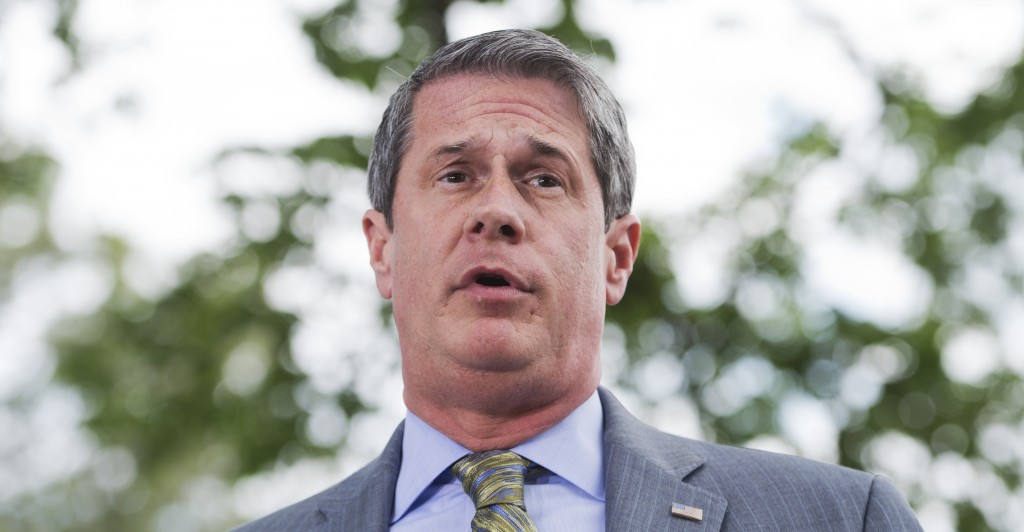 Vitter was referring to the EPA’s rebuttal of allegations by GOP
lawmakers that the Natural Resources Defense Council, a New York-based
international environmental organization, had an outsized influence on
the agency’s proposed rule to limit carbon emissions at existing power
plants.
Vitter was referring to the EPA’s rebuttal of allegations by GOP
lawmakers that the Natural Resources Defense Council, a New York-based
international environmental organization, had an outsized influence on
the agency’s proposed rule to limit carbon emissions at existing power
plants.
The emails surfaced after a joint request last month to EPA Administrator Gina McCarthy by Vitter, Issa and four other Republican lawmakers.
Nick Loris, a Heritage Foundation economist who focuses on energy and the environment, calls the Obama administration’s new carbon rules “nothing short of an attack on affordable, reliable energy.”
>>> Commentary: States Plan for Higher Energy Prices Resulting From Obama’s Climate Plan
Claiming 1.4 million members and online activists, the Natural Resources Defense Council lobbies and litigates for “curbing global warming” and “creating the clean energy future,” among other issues.
The organization, founded in 1978, has received $1.9 million in EPA grants since January 2009.
 Allegations of the environmental group’s undue influence arose July 6 when The New York Times
reported on the EPA’s close relationship with three of the
organization’s principals—lawyers David Doniger and David Hawkins and
scientist Daniel Lashof.
Allegations of the environmental group’s undue influence arose July 6 when The New York Times
reported on the EPA’s close relationship with three of the
organization’s principals—lawyers David Doniger and David Hawkins and
scientist Daniel Lashof.
“The three were as seasoned and well connected as Washington’s best-paid lobbyists because of their decades of experience and the relationships they formed in the capital,” reporter Coral Davenport wrote.
The trio’s 110-page proposal, focused on cutting carbon pollution from coal-fired power plants, was “widely viewed as innovative and audacious,” the article said, adding: “On June 2, President Obama proposed a new Environmental Protection Agency rule to curb power plant emissions that used as its blueprint the work of the three men and their team.”
In a July 10 email obtained by Politico, EPA chief McCarthy scoffs at the suggestion of an inappropriately close relationship with the green group.
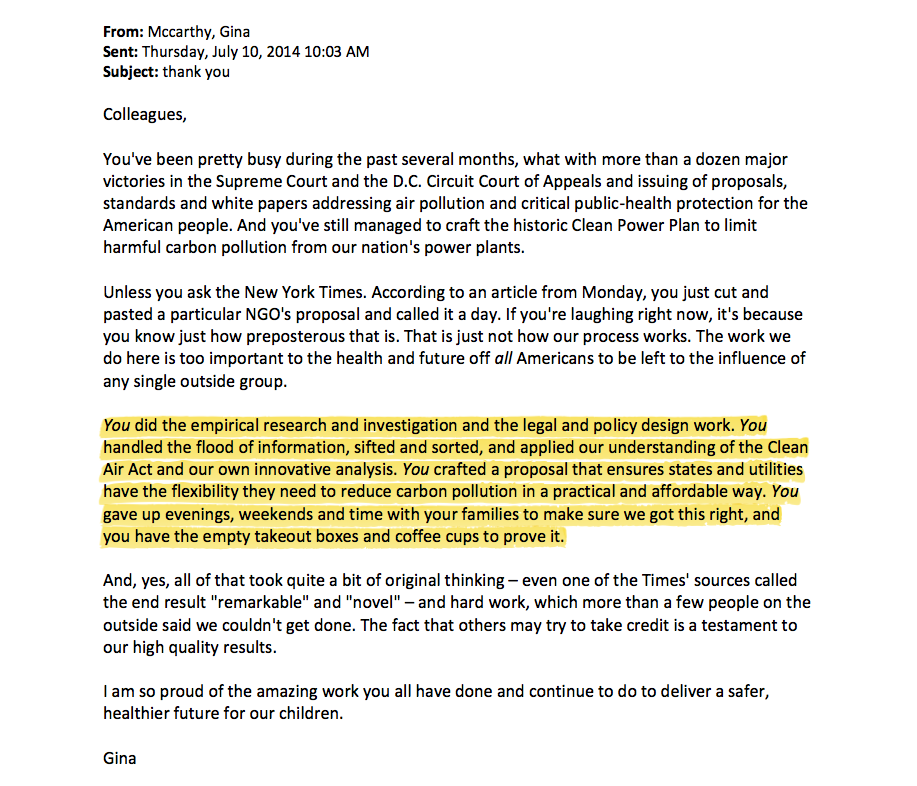
On Sept. 4, two days after Vitter and Issa pressed their questions in their letter to McCarthy, the Natural Resources Defense Council denied in a blog post that it had influenced the actions of the EPA “outside of the normal regulatory process.”
But the emails between EPA chief McCarthy and Doniger, the green group’s policy director for climate and clean air, reveal close communications dating back to 2010.
McCarthy was assistant administrator at the EPA from 2009 to July 2013, when the Senate confirmed Obama’s nomination of McCarthy as administrator after a four-month confirmation battle in which Vitter posed more than 500 questions.
Of her agency’s announcement just before Christmas 2010 of amendments to the mandatory reporting of greenhouse gases, McCarthy emailed Doniger that “the success is yours as much mine.”

In 2011, email correspondence produced as the result of the congressional inquiry show at least five meetings between McCarthy and representatives of the green group regarding Section 111, which Loris describes as the “meat” of the Obama administration’s climate change regulations.
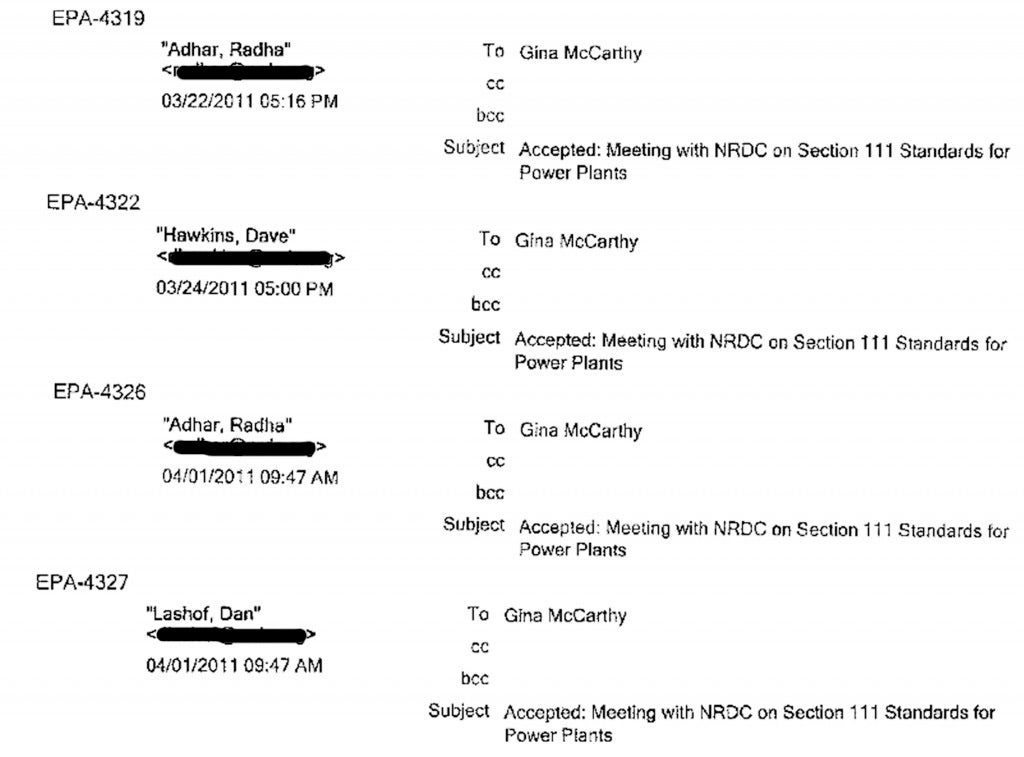
In June 2011, Doniger emailed McCarthy a copy of the organization’s “Technical and Legal Framework for Power Plant Carbon Emissions Standards Under Clean Air Act Section 111,” requesting a meeting on the environmental group’s proposal.
McCarthy’s response to Doniger includes the words: “I would never say no to a meeting with you.”
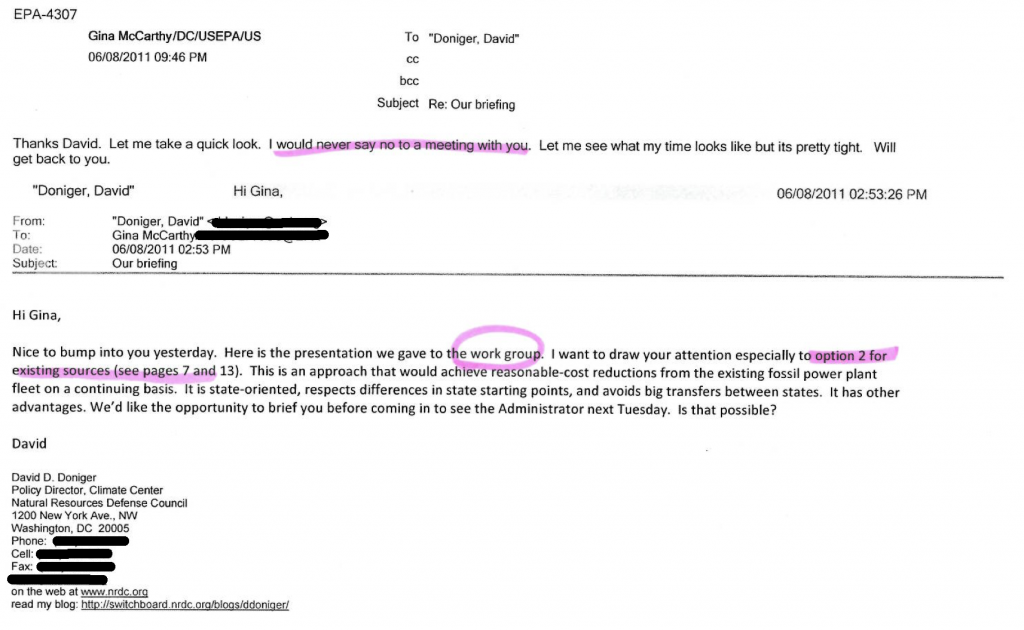 In their Sept. 2 letter to
McCarthy, six GOP lawmakers — including Vitter and Issa — demanded
release of documents and information regarding the environmental group’s
involvement in drafting the EPA’s proposed rules. They wrote:
In their Sept. 2 letter to
McCarthy, six GOP lawmakers — including Vitter and Issa — demanded
release of documents and information regarding the environmental group’s
involvement in drafting the EPA’s proposed rules. They wrote:
Paul J. Larkin, a senior legal research fellow at The Heritage Foundation, said the emails don’t appear to show anything “unlawful” about the EPA’s relationship with the Natural Resources Defense Council, but stressed that the agency has a responsibility to independently assess outside recommendations. Larkin said:
“When EPA’s policies affect the whole spectrum of American businesses and families, which they do, it is absolutely inappropriate for one outside organization to have excessive influence on those policies, and this is not how our federal government should be run,” the Louisiana Republican told The Daily Signal.
“In order to have a fair regulatory process, EPA should consider all stakeholders’ opinions equally. These emails show how that’s not the case,” he said.
Warning that the EPA’s carbon plan would increase the cost of energy and most goods for American families, Vitter called it the Obama administration’s attempt to impose in America the failed climate policies that have been a disaster in Europe:
Reynolds’ blog attacks Vitter, Issa and other Republican lawmakers for pushing a “flawed, cherry-picked narrative that simply ignores the well-documented and widely reported and recognized sweep and range of the agency’s engagement with the public, states and stakeholders over the past 14 months.”
Of the idea that the EPA “inappropriately” collaborated with the Natural Resources Defense Council, Reynolds writes:
“The difference between most organizations and NRDC is that most organizations are actually trying to create jobs and provide opportunity for their fellow Americans,” Vitter said, adding:
Sen. David Vitter, R-La., the top Republican on the Environment and Public Works Committee, told The Daily Signal that the Natural Resources Defense Council played an “absolutely inappropriate” role in drafting the EPA’s new carbon emissions plan.
“The EPA has been one of the least transparent agencies I have ever seen, but it’s become apparent that their lack of transparency is to hide the influence that an organization so heavily focused on undermining U.S. businesses and families has at EPA,” Vitter said.
Vitter and House Oversight and Government Reform Chairman Darrell Issa, R-Calif., have directed staff to look into whether the EPA broke federal law in developing the carbon emissions regulations.
Newly released emails between the EPA and the green group, Vitter said, show that the agency didn’t push to “consider all stakeholders’ opinions equally.” He added:
While both sides have denied NRDC’s improper influence over the EPA’s development of the carbon rule, these emails clearly demonstrate their beyond-cozy relationship and force the question: Who is working for whom?

Sen. David Vitter, R-La., says EPA seeks to ‘hide the influence’ of a major green group. (Photo: Newscom)
The emails surfaced after a joint request last month to EPA Administrator Gina McCarthy by Vitter, Issa and four other Republican lawmakers.
Nick Loris, a Heritage Foundation economist who focuses on energy and the environment, calls the Obama administration’s new carbon rules “nothing short of an attack on affordable, reliable energy.”
>>> Commentary: States Plan for Higher Energy Prices Resulting From Obama’s Climate Plan
Claiming 1.4 million members and online activists, the Natural Resources Defense Council lobbies and litigates for “curbing global warming” and “creating the clean energy future,” among other issues.
The organization, founded in 1978, has received $1.9 million in EPA grants since January 2009.

Actors
Leonardo DiCaprio, Cameron Diaz and Lisa Kudlow are among celebrities
who support the Natural Resources Defense Council. DiCaprio sits on the
organization’s board. (Photos: Natural Resources Defense Council)
“The three were as seasoned and well connected as Washington’s best-paid lobbyists because of their decades of experience and the relationships they formed in the capital,” reporter Coral Davenport wrote.
The trio’s 110-page proposal, focused on cutting carbon pollution from coal-fired power plants, was “widely viewed as innovative and audacious,” the article said, adding: “On June 2, President Obama proposed a new Environmental Protection Agency rule to curb power plant emissions that used as its blueprint the work of the three men and their team.”
In a July 10 email obtained by Politico, EPA chief McCarthy scoffs at the suggestion of an inappropriately close relationship with the green group.

On Sept. 4, two days after Vitter and Issa pressed their questions in their letter to McCarthy, the Natural Resources Defense Council denied in a blog post that it had influenced the actions of the EPA “outside of the normal regulatory process.”
But the emails between EPA chief McCarthy and Doniger, the green group’s policy director for climate and clean air, reveal close communications dating back to 2010.
McCarthy was assistant administrator at the EPA from 2009 to July 2013, when the Senate confirmed Obama’s nomination of McCarthy as administrator after a four-month confirmation battle in which Vitter posed more than 500 questions.
Of her agency’s announcement just before Christmas 2010 of amendments to the mandatory reporting of greenhouse gases, McCarthy emailed Doniger that “the success is yours as much mine.”

In 2011, email correspondence produced as the result of the congressional inquiry show at least five meetings between McCarthy and representatives of the green group regarding Section 111, which Loris describes as the “meat” of the Obama administration’s climate change regulations.

In June 2011, Doniger emailed McCarthy a copy of the organization’s “Technical and Legal Framework for Power Plant Carbon Emissions Standards Under Clean Air Act Section 111,” requesting a meeting on the environmental group’s proposal.
McCarthy’s response to Doniger includes the words: “I would never say no to a meeting with you.”
 In their Sept. 2 letter to
McCarthy, six GOP lawmakers — including Vitter and Issa — demanded
release of documents and information regarding the environmental group’s
involvement in drafting the EPA’s proposed rules. They wrote:
In their Sept. 2 letter to
McCarthy, six GOP lawmakers — including Vitter and Issa — demanded
release of documents and information regarding the environmental group’s
involvement in drafting the EPA’s proposed rules. They wrote:The fact that an ideological and partisan group drafted a rule that places a tremendous cost on everyday Americans through increased electricity prices is harmful and outrageous. … Accordingly, these practices must cease immediately.Also signing the letter were Sen. Jim Inhofe R-Okla., Sen. John Barrasso, R-Wyo., Rep. Jim Jordan, R-Ohio, and Rep. James Lankford, R-Texas.
Paul J. Larkin, a senior legal research fellow at The Heritage Foundation, said the emails don’t appear to show anything “unlawful” about the EPA’s relationship with the Natural Resources Defense Council, but stressed that the agency has a responsibility to independently assess outside recommendations. Larkin said:
There is nothing inherently unusual or unlawful about a private organization, such as the NRDC, contacting a government agency, such as the EPA, in an attempt to influence public policy. In fact, the First Amendment expressly guarantees every person the right to petition the government for a redress of grievances. Nor is there anything inherently unusual or unlawful in the EPA’s willingness to listen to what an organization like the NRDC has to say.Citing the extent to which the EPA’s policies affect Americans across the country, Vitter called the environmental group’s influence “absolutely inappropriate.”
At the same time, every government official, whether employed by the EPA or elsewhere, is obligated to use his or her best judgment to decide what policy best serves the public, not the interests of a private organization. That is where the rubber meets the road.
“When EPA’s policies affect the whole spectrum of American businesses and families, which they do, it is absolutely inappropriate for one outside organization to have excessive influence on those policies, and this is not how our federal government should be run,” the Louisiana Republican told The Daily Signal.
“In order to have a fair regulatory process, EPA should consider all stakeholders’ opinions equally. These emails show how that’s not the case,” he said.
Warning that the EPA’s carbon plan would increase the cost of energy and most goods for American families, Vitter called it the Obama administration’s attempt to impose in America the failed climate policies that have been a disaster in Europe:
This carbon plan would mean a permanent stagnant economy with limited growth potential that will kill hundreds of thousands of jobs and projects all across the country. It will decrease electricity reliability the same as in Europe, and it will be a crushing blow to the poor and elderly as energy poverty becomes a new normal just like what we’re seeing in Europe.The Daily Signal sought comment Oct. 10 from the Environmental Protection Agency. The EPA replied hours later with a blog just posted by Associate Administrator Tom Reynolds, who heads the agency’s Office of Public Affairs.
Reynolds’ blog attacks Vitter, Issa and other Republican lawmakers for pushing a “flawed, cherry-picked narrative that simply ignores the well-documented and widely reported and recognized sweep and range of the agency’s engagement with the public, states and stakeholders over the past 14 months.”
Of the idea that the EPA “inappropriately” collaborated with the Natural Resources Defense Council, Reynolds writes:
Our proposal, announced in June, was developed through extensive public outreach—one that reached tens of thousands of people across the country. EPA consulted with states, power companies, local communities, environmental groups, associations, labor groups, tribes, and many more. Before we put out the proposal, EPA met with more than 300 stakeholders, to gather their thoughts and ideas.The agency’s public counterpunch appeared unlikely to impress Vitter.
“The difference between most organizations and NRDC is that most organizations are actually trying to create jobs and provide opportunity for their fellow Americans,” Vitter said, adding:
This particular organization has advocated relentlessly to harm our energy and manufacturing sector, and EPA providing this organization an outsized role in the regulatory process is incredibly unfair to American families that rely on a healthy economy to sustain their livelihoods.
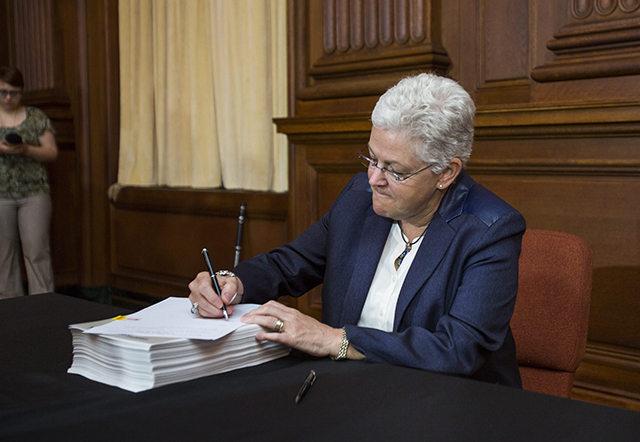
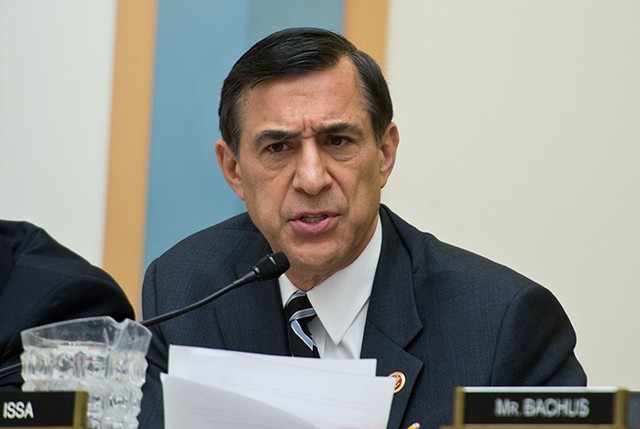

No comments:
Post a Comment